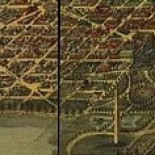What Once Was: Teddy Roosevelt and Washington DC’s “Smoke Nuisance”
FOOTNOTES
[1] Theodore Roosevelt, Fifth Annual Message Online by Gerhard Peters and John T. Woolley, The American Presidency Project https://www.presidency.ucsb.edu/node/206214
[2] Theodore Roosevelt, Fifth Annual Message Online by Gerhard Peters and John T. Woolley, The American Presidency Project https://www.presidency.ucsb.edu/node/206214
[3]“full and verified publication in detail of all the sums contributed to and expended by the candidates or committees of any political parties…” Fifth Annual Message Online by Gerhard Peters and John T. Woolley, The American Presidency Project https://www.presidency.ucsb.edu/node/206214
[4] “…it has proved so difficult to enforce the migration laws where long stretches of frontier marked by an imaginary line alone intervene between us and our neighbors that I recommend that no immigrants be allowed to come in from Canada and Mexico save natives of the two countries themselves.” Fifth Annual Message Online by Gerhard Peters and John T. Woolley, The American Presidency Project https://www.presidency.ucsb.edu/node/206214
[5] “The Government should see to it, for instance, that the hygienic and sanitary legislation affecting Washington is of a high character. The evils of slum dwellings, whether in the shape of crowded and congested tenement-house districts or of the back-alley type, should never be permitted to grow up in Washington. The city should be a model in every respect for all the cities of the country. The charitable and correctional systems of the District should receive consideration at the hands of the Congress to the end that they may embody the results of the most advanced thought in these fields. Moreover, while Washington is not a great industrial city, there is some industrialism here, and our labor legislation, while it would not be important in itself, might be made a model for the rest of the Nation. We should pass, for instance, a wise employer’s-liability act for the District of Columbia, and we need such an act in our navy-yards. Railroad companies in the District ought to be required by law to block their frogs.” Theodore Roosevelt, Second Annual Message Online by Gerhard Peters and John T. Woolley, The American Presidency Project https://www.presidency.ucsb.edu/node/206194
[6] Theodore Roosevelt, Third Annual Message Online by Gerhard Peters and John T. Woolley, The American Presidency Project https://www.presidency.ucsb.edu/node/206201
[7] Theodore Roosevelt, Fourth Annual Message Online by Gerhard Peters and John T. Woolley, The American Presidency Project https://www.presidency.ucsb.edu/node/206208
[8] “Enforcing Bad Laws” Evening Star December 8, 1905; “Smoke” Evening Star December 7, 1905.
[9] Message from the President of The United States, transmitting a Report from The Secretary of State, and its accompanying papers, concerning The Smoke Abatement Exhibition which was Held at South Kensington, London, Last Winter. June 16, 1882; “The Smoke Abatement Exhibition”, Nature, Jan. 5, 1882; 219-221,
[10] “Prevention of Smoke in The District of Columbia.” Congressional Record June 26, 1898, pp. 6378-79; Smoke in The District of Columbia, Etc. House of Representatives, Report No. 1623. July 23, 1898.; A comparison of these ordinances and others is made in Samuel B. Flagg. “Smoke Abatement and City Smoke Ordinances: Bureau of Mines, Bulletin 49. (Washington, DC, GPO, 1912), which includes model ordinances.
[11] Letter from Theodore Roosevelt to the Commissioners of the District of Columbia. Theodore Roosevelt Papers. Library of Congress Manuscript Division. https://www.theodorerooseveltcenter.org/Research/Digital-Library/Record?libID=o181242. Theodore Roosevelt Digital Library. Dickinson State University.
[12] New Anti-Smoke Law: Measure Approved by Board of Trade Committee. Washington Post; March 8, 1902.
[13] Report of The Health Officer of The District of Columbia. 1904. Washington: Government Printing Office. 1904. P. 31, 76.
[14] Report of The Health Officer of The District of Columbia. 1903. Washington: Government Printing Office. 1903. P. 22.
[15] Sinclair v. District of Columbia, 20 App.D.C. 336 (1902)
[16] “About smoke law furnace men say red hot things” Washington Times December 27, 1904; “By Some Devices Smoke Nuisance Is Eradicable.” Washington Times December 28, 1904.
[17] “Answer President” Evening Star, January 12, 1905; “President Receives Long-Delayed Letter on Smoke Violations”, Washington Times, January 12, 1905; “Fines Are Too Small: Letter to President on Smoke Law by Commissioners” Washington Post, January 13, 1905.
[18] Hearing Before the Committee on The District of Columbia Of the United States Senate, Monday, January 16, 1905, On the Bill (8. 5108) To Amend an Act for The Prevention of Smoke in The District of Columbia, And for Other Purposes, Approved February 2, 1899. Washington: Government Printing Office. 1905. p.43-44
[19] “Little Smoke in City: Investigation Shows Nearly All Firms Obey Law.” Washington Post April 18, 1906.
[20] “Ketcham Smoke-Law Bill: Sent to The Commissioners” Washington Post, January 24, 1906; “Smoke Law Dies in Senate.” Washington Post, March 4, 1907; “Modification of Smoke Law; Appeal made by Georgetown Citizens.” Evening Star, February 4, 1908; “Ice Plant Is Shut Down.” Washington Post, Sep 17, 1908; LOST CAPITOL HILL: THE HYGENIC ICE FACTORY https://thehillishome.com/2014/12/lost-capitol-hill-the-hygenic-ice-factory/
[21] Report of The Health Officer of The District of Columbia. 1911. Washington: Government Printing Office. 1911. P. 34, 85.
[22] “Smoke Law Violation Is Charged to Capitol.” Washington Post, March 8, 1930.
